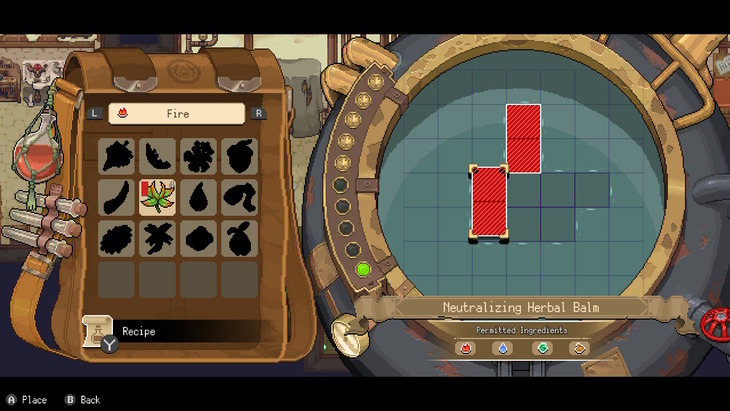
Over the last few decades, it’s become easier than ever for independent publishers to claim a slice of the gaming pie. Farming and social sims have seen a huge increase in market share especially, with many Nintendo Switch users in particular clamoring for more simple, comforting games. Potion Permit is a relatively new entry in the genre of cozy games competing for the spotlight among heavy hitters like Disney Dreamlight Valley and Animal Crossing.
Players enter the town of Moonbury as a chemist sent to cure the mayor’s daughter, whom the local witch doctor cannot help any further. Unfortunately for you, the town had a nasty incident with a chemist prior that left a bad taste in their mouths. The player must now work to, not only heal sick villagers, but also gain their trust. Along the way, you must also upgrade your equipment, adventure into new lands around the village, and become the best chemist you can be.
While there isn’t a huge overarching story for this game, Potion Permit manages to make every single story beat feel earned. Many of these new plot points are triggered by helping a certain number of people or opening up new sections of land. In some games, this might feel frustrating, but because the whole point of Potion Permit is to earn the trust of the town, it allows developments to feel natural. This, combined with the smaller stories found tucked into quests with individual villagers, make the world feel lived in and authentic.
Potion Permit is part puzzle game, part social simulator and part adventure game. It’s also very open ended, often allowing players to prioritize what they find most fun. The entire system is easy to learn despite the variety of mechanics the game uses to tell its story.
The most important part of Potion Permit is, of course, the potions. Over the course of the game, players are tasked with crafting various potions to heal the townspeople or help them with their dilemmas in life. The actual act of crafting potions comes with a shape puzzle: different resources make different shapes like Tetris blocks and the chemist must place them inside the designated shape required by the potion recipe. Each resource has its own block pattern and cannot be rotated, and they cannot overlap either. Potions are simple starting out, and so are the ingredients, often providing just a few blocks of filler at a time. As the story progresses however, potions get more complex. This forces the player to upgrade their cauldron and seek out better resources.

Create potions by utilizing different ingredients and placing blocks in the right spots to solve the puzzle.
Creating the potions is very fun and a great way to add a little critical thinking into the mix of an otherwise fairly simple farming/social sim. It forces the player to be aware of what resources they have and what they should stock up on again next time they venture out into the wilderness. Since upgrading the cauldron and tools costs a lot of funds and resources as well, players must often get clever and think about how to place each block. Anything that’s tricky enough to require an upgrade of some sort usually doesn’t have a deadline attached, which keeps the game from feeling frustrating or like it’s blocking you at every turn, a welcome relief.
There are three kinds of resources available in Potion Permit, with some overlap between them. Chemists can gather materials used in potions, items that are used for upgrading their buildings and equipment, and food items. Players cannot craft potions without plentiful and varied resources, and having items like wood, stone, or iron nuggets on hand will not only help unlock better equipment but also assist you when villagers ask for help with their own requests.
There are three distinct areas of the wilderness chemists can explore: Meadow Range, Glaze Iceberg, and Barren Wasteland. The meadow is available early on and has the easiest items to gather, but there is a difficulty increase for each successive area. Some creatures living in these areas are actively hostile, which means you must be on your toes and have either the equipment or the health to survive. One of the biggest problems with the game is that resource gathering can get very repetitive after a short period of time, especially with as many requests as the villagers make. The battles help keep players on their toes and introduce a small element of variety, though it’s never quite enough to keep a longer play session from getting tiring.
Potion Permit is also a social sim, hosting over 30 different characters that you can befriend. Players can talk to each character once a day and give them moon cloves, a great symbol of friendship in Moonbury. Each character has at least two bars of trust to max out, and once you have completed a bar, a quest centering around them will be unlocked on the community billboard. While some of the daily dialogue available can get a bit repetitive after a while, the quests are all wonderfully unique to each character and provide a great look into how nuanced each villager really is. The developers also seem to be making a conscious effort to include people of all kinds, including those dealing with mental illness and disabilities, though some portrayals come across better than others.
In addition to the friendship levels, six of these have a romance option and have a third bar of friendship available. Once this bar is complete and a third quest finished, the player can give them a moon brooch to begin dating that character. This unlocks a bit of extra lovey dovey dialogue and the ability to go on dates, but unfortunately that’s where the romance route ends. You can’t get married to them and they’ll never move in with you, which is unfortunate especially if you’ve put work into upgrading your home. Some of the romance options have better stories and dialogues than others, but there are also no restrictions on how many of the six you date at the same time, which is a nice bonus for being able to see everyone’s full dialogue.
One of the most clever elements of Potion Permit is your furry friend. Spot, Fido, Lassie, or (quite literally) whatever you want to call them, will follow you around everywhere you go. While your pet isn’t allowed indoors, pets prove a great asset for adventuring or wandering around the village. You can pet them whenever you like and they must be fed once a day, but once their trust is built up enough, they will dig things like truffles and worms out of the ground for use in fishing and cooking.
However, a pet’s greatest skill is their ability to find NPCs. You can ask them to locate any villager you have met and as long as they aren’t in your sick bay, they’ll take off running after them. This gets rid of the need to memorize schedules or look at a wiki all the time, like with Stardew Valley, and prevents the sort of strange omniscience that comes with having the characters marked on the map all the time. While it’s incredibly clever, it’s not without its flaws. Occasionally, it will glitch, and the little guy won’t move at all, no matter how many times you ask. The character Reyner was in particular a sore spot for the pup; he often just sat there even when asked repeatedly to find him.
Throughout the game, the player will encounter a decent variety of minigames, ranging in style and difficulty. While the player receives funds from healing villagers and selling potions, there are three opportunities to earn more money around the village. Diagnosing a patient’s illness will often require players to go through one of three minigames chosen at random as well. These minigames range from memory sequences to rhythm games and even simply mashing the A button so many times. None of them are particularly elegant, and they all provide enough wiggle room for failure to keep them from being a real challenge. Still, they help liven up the gameplay and provide a sense of accomplishment for players.
Potion Permit’s art may be simple, but that doesn’t stop it from being beautiful. The creature designs are fun and the developers clearly had fun designing new plants for the areas. Each potion has a lovely bottle that it comes in that would make perfume bottle collectors jealous. While it might be easy to overlook the scenery, you can tell there’s a lot of love and care put into dressing the town and the three main areas. The real star of the art however is probably the character art. Each character design is unique, a difficult feat to pull off when the number of NPCs is so high. Players should be able to tell a lot about each character from their designs alone, which is impressive when dealing with a more pixelated art style.
While Potion Permit’s soundtrack is charming and quite fitting of the settings around the village, it’s also generic and forgettable. Unlike many similar games in the “cozy” genre, it’s highly unlikely players will remember the music enough to hum it later in the day. In the absence of voice acting, music is an easy way to help fill emotional beats and yet Potion Permit is lacking in this department. Still, the soundtrack does an adequate job of setting an appropriate atmosphere and isn’t distracting, so the game is not terribly lesser for it.
Potion Permit is a fairly linear game, and as such does not lend itself to much replay value. There is only one ending, but the game allows you to date multiple people at once. Unless a player is just utterly committed to the concept of monogamy, they can see all the villager’s date options in one play-through with little extra effort. Because of all the various upgrades that are available, one advantage of a second play-through might be prioritizing different strategies to see if it makes anything easier with your play style. However, upgrades are fairly easy to obtain with little effort, so there is not a huge difference. This makes Potion Permit more of a “once and done” game, unless you truly love the joy of getting to know the cute little villagers over and over again.
Potion Permit is, at its heart, a charming game full of cute characters and fun mechanics. Though it can come across as a bit simplistic in certain elements, it is the perfect game for when you want to turn your brain off after a long day at work and just have a little adventure without high stakes or intense difficulty. Potion Permit may not revolutionize the game industry, but if you are looking for something fun and cozy with cute characters and puzzles, this is the game for you.
Final rating: 8.5/10.